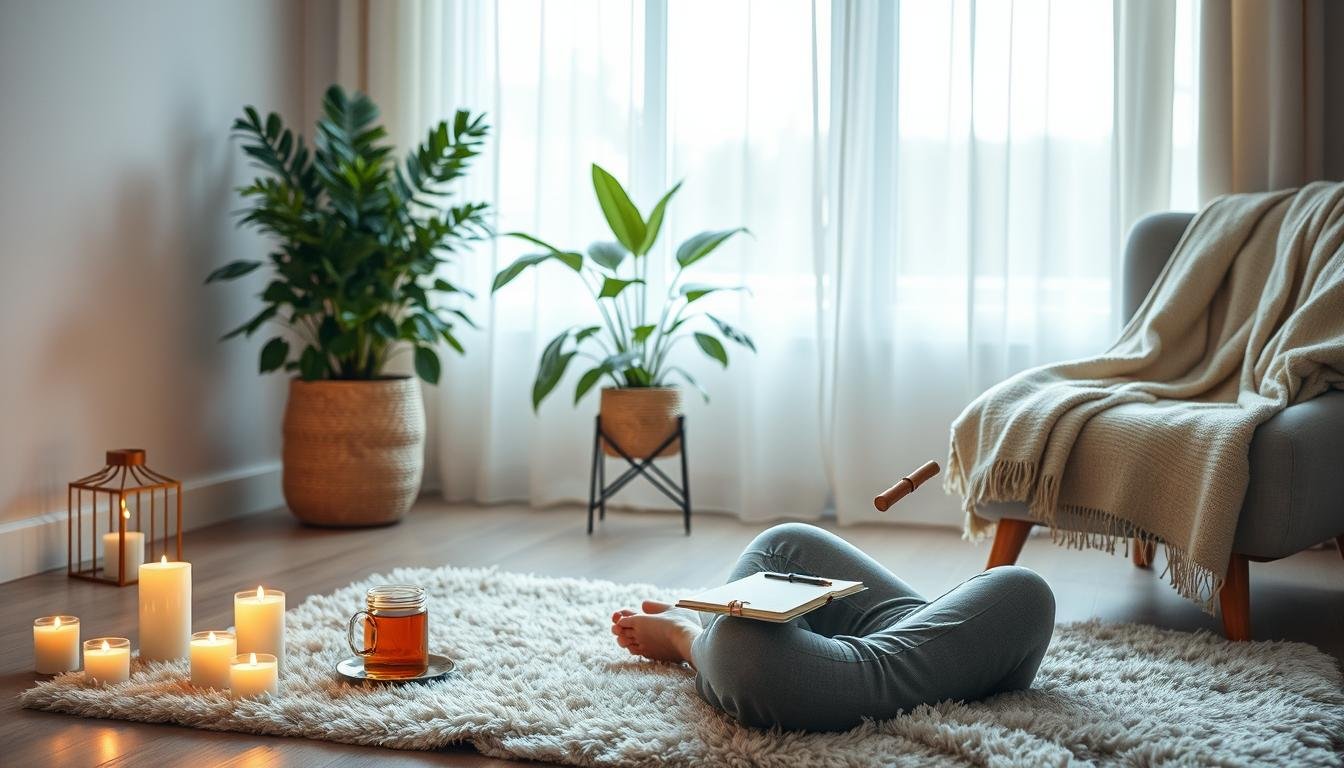Self-care tips are not just for luxury; they’re key to staying strong in today’s fast world. Some think they’re selfish, but research proves they boost happiness and success. They help keep your body, mind, and social life healthy.
Picture a life where simple habits like deep breathing or short walks cut stress and boost focus. This article shows how self-care can change your mental health. It makes room for happiness without dropping your duties.
Key Takeaways
- Self-care builds resilience against burnout and improves emotional stability.
- Simple routines like exercise and journaling are powerful self-improvement tools.
- Mental wellness depends on balancing physical health, social connections, and personal boundaries.
- Small daily actions, not grand gestures, create lasting positive change.
- Self-care isn’t a reward—it’s the foundation of healthy relationships and productivity.
Understanding the Importance of Self-Care
Self-care is not a luxury, it’s a must. Self-care tipsare not just about spa days or weekend hobbies. It’s about making choices every day that help your mind, body, and spirit grow.
What is Self-Care?
Self-care means taking steps to protect your well-being. This includes:
- Healthy eating and sleep routines
- Regular physical activity
- Emotional check-ins and stress management
It’s not selfish. Experts say it’s key to holistic health. The Journal of Clinical Psychology found that self-care habits improve resilience.
The Benefits of Prioritizing Self-Care
Science shows the benefits:
- Stress reduction: Lower cortisol levels boost immunity and focus.
- Enhanced mood: Routine self-care reduces anxiety and depression risks.
- Stronger relationships: People who practice self-care communicate better and form deeper connections.
Investing in self-care helps you grow. It lets you face challenges with clarity. Over time, it builds a strong foundation for your mental and physical health, showing that small steps lead to big results.
Creating a Self-Care Routine
Starting a self-care routine is about making small, thoughtful choices. Choose habits that fit your life and values. It’s more important to be consistent than perfect.
How to Get Started
Begin by looking at your current habits and finding what’s missing. Think about what makes you feel alive and what drains you. Use this to create a routine that suits you.
- Set achievable goals, like adding one new habit each week.
- Keep track of your progress in a journal or app to stay on track.
- Change your routines as needed to keep balance in your life.
Daily Self-Care Practices
Include these easy yet effective healthy habits in your daily routine:
- Morning mindfulness: Take 5 minutes for meditation or deep breathing.
- Nutrition breaks: Eat well-balanced meals and drink plenty of water all day.
- Move your body: Do some walking, stretching, or dancing for 10–15 minutes every day.
- Evening reflection: Write down three good things that happened before you go to bed.
Regular self-care routine helps with personal growth by taking care of your body and mind. Try different activities to find what makes you feel better. Remember, taking care of yourself is not selfish—it’s necessary for living a full life.
Physical Self-Care Strategies
Physical self-care is key to feeling good. It includes moving, eating right, and resting. These habits help your body and mind stay healthy.
The Role of Exercise
Exercise helps reduce stress and boosts your mood. Even a short workout can make a big difference. Try these tips:
- Walking, cycling, or swimming for cardiovascular health
- Yoga or stretching to ease tension
- Strength training twice weekly to build resilience
Eating Well for Improved Health
Good nutrition helps your body heal and grow. Eat balanced meals to keep your gut and brain healthy. Focus on:
- Whole foods like leafy greens, nuts, and berries
- Hydration with water or herbal teas
- Mindful eating to avoid overconsumption
Quality Sleep: The Foundation of Wellness
Bad sleep can hurt your focus and mood. Improve your sleep with these tips:
- Set a consistent bedtime and wake time
- Dim lights 1 hour before bed to signal rest
- Avoid caffeine after noon and limit naps
Emotional Self-Care Techniques
Mental wellness is about finding emotional balance. Start by tackling stress head-on with mindfulness. These practices help you stay in the moment, avoiding worries about the past or future.
Managing Stress Through Mindfulness
Start with 5 minutes of mindful breathing each day. Breathe in deeply through your nose, hold for 4 counts, then breathe out slowly. Body scans can also help, by mentally checking each part of your body for tension. Doing this regularly helps you handle stress better.
“The present moment is the only place where you can act.” — Jon Kabat-Zinn
Journaling for Emotional Clarity
Journaling helps you understand your feelings. Write about what you’re feeling each day. Try prompts like: “What am I avoiding today?” or “List three small wins this week.” Writing about things you’re grateful for, like the warmth of sunlight, can also shift your focus to the positive.
Setting Boundaries to Protect Your Peace
- Practice saying “no” without guilt during overwhelming requests
- Use clear statements like “I need to step back now” when overwhelmed
- Block specific times for work vs. personal activities
Setting boundaries is a sign of self-respect. They help you avoid feeling drained and support managing stress over time.
Social Self-Care Practices
Healthy relationships are key for self-improvement and mental wellness. They help reduce stress and support personal growth. Studies show people with strong social networks have less anxiety and depression.
The Importance of Strong Relationships
Quality is more important than quantity. A Harvard Study found that strong ties to friends and family are crucial for a long life. Regular talks with trusted people create emotional support systems for facing life’s challenges.
Engaging in Meaningful Connections
Deepen relationships through active listening and shared activities. Here are some steps:
- Schedule weekly check-ins with loved ones
- Join clubs or groups aligned with your interests
- Practice empathy when conflicts arise
Even when we’re isolated, technology helps us stay connected. It’s important to know when to take time for self-reflection. Healthy social care balances connection and alone time.
| Relationship Type | Key Benefits |
|---|---|
| Friendships | Emotional support and fun |
| Family bonds | Long-term stability |
| Professional networks | Career opportunities and mentorship |
“Loneliness can be alleviated not by being in a crowd but by finding the right crowd.”
Self-Care Activities for the Mind
Boost your mental health with activities that spark curiosity and calm your mind. Reading and creativity are great for both relaxation and self-improvement. They turn idle time into chances for personal growth.

Reading for Relaxation and Growth
Books open doors to new views. Fiction provides relaxation techniques through stories, while nonfiction teaches new things. Here are some ideas:
- Mystery novels: Improve focus and problem-solving.
- Biographies: Learn about resilience and making decisions.
- How-to guides: Pick up practical skills for daily life.
Embracing Creativity in Your Life
Creative activities make your mind more flexible. Even small things like doodling or baking can help. They reduce stress and boost creativity. Here are some ideas:
| Activity | Time Commitment | Mental Benefits |
|---|---|---|
| Journaling | 15 minutes daily | Clears thoughts, lowers anxiety |
| DIY Crafts | 30 minutes weekly | Improves problem-solving |
| Playing an instrument | 45 minutes weekly | Boosts memory and patience |
“Creativity is the mind’s way of recharging,” says the American Psychological Association. It boosts cognitive flexibility and emotional strength.
Add these activities to your daily routine for a sharper, more balanced mind. It’s not about being perfect. It’s about enjoying the process of learning and creating.
Exploring Nature as Self-Care
Nature is a free and easy way to care for our minds and bodies. Studies show that being outside can lower stress and make us feel better. This section talks about how nature activities fit into healthy habits for overall wellness.
Benefits of Spending Time Outdoors
Research shows that being in green spaces can lower stress and improve focus. Activities like forest bathing (shinrin-yoku) can even boost our mood and immune system. Our natural need for nature, known as biophilia, makes spending time outside a key stress management strategy.
| Setting | Activity Example |
|---|---|
| Urban Areas | Park visits, rooftop gardens, or window planters |
| Suburban | Local trails, community gardens, or backyard gardening |
| Rural | Hiking, wildlife observation, or nature journaling |
Nature Walks: Simple Yet Effective
Adding nature walks to your daily routine can clear your mind. Here’s how:
- Walk in a park for 20–30 minutes daily
- Practice mindful observation of surroundings
- Pair walks with deep breathing as relaxation techniques
Even small actions like caring for houseplants or sitting under a tree help. These actions help manage stress without needing big plans. Nature’s healing power is available to everyone, everywhere.
Digital Detox for Mental Clarity
Too much screen time can hurt our mental health. Mindfulness helps by cutting down on digital use and choosing better online interactions. Start to focus better with these simple steps.
Reducing Screen Time
Stop endless scrolling with a plan:
| Strategy | Impact |
|---|---|
| Schedule screen-free hours daily | Boosts sleep quality and focus |
| Use device timers | Encourages intentional tech use |
| Disable non-essential notifications | Reduces stress triggers |
Curating Your Online Presence
Choose content that matches your values. Follow accounts that inspire you, not make you feel bad. Try these steps:
- Unfollow accounts that spark anxiety
- Limit social media to set times
- Engage with creators who promote positivity
Change how you use the internet to feel energized, not drained. Focus on interactions that help your mental health.
Financial Self-Care Tips
Managing your finances is key to self-care. When money worries disappear, you can focus on growing and finding peace. These tips help turn financial habits into tools for stability and empowerment.

Budgeting for Peace of Mind
Begin with clarity. Track every dollar for a month using apps like Mint or a journal. Highlight:Identify 20% of expenses that cause stress and adjust them first.
- Create a “values-based” budget: align spending with life goals like travel or family time.
- Automate savings: Set 10% of income to an emergency fund monthly.
- Replace the word “budget” with “plan” to shift mindset from restriction to strategy.
Investing in Yourself and Your Future
“Your future self depends on choices you make today.” – Dave Ramsey
Personal growth means treating self-improvement as a must. Set aside money for:
- Certification courses (e.g., LinkedIn Learning, Coursera)
- Health checkups and mental wellness subscriptions
- Retirement accounts like Roth IRAs for long-term security
Every $50 spent on learning or $20 saved weekly matters. Small steps build financial confidence. They turn money management into a daily self-care act.
Seasonal Self-Care Ideas
Changing your self-care routine with the seasons keeps you balanced all year. Nature’s cycles affect our energy and mood. So, our care practices should change with the seasons. An image of someone enjoying autumn leaves shows how to stay well seasonally:
Adapting Your Routine to Each Season
Adjust your approach to fit each season’s needs:
- Winter: Fight off the gloom with relaxation techniques like light therapy lamps. Try yoga or reading indoors.
- Spring: Get outside with walks and gardening. Stay hydrated and follow healthy habits like smoothies.
- Summer: Stay cool with pool workouts or sunset hikes. Use hats and SPF for skin health.
- Fall: Mindfulness is key as days get shorter. Plan cozy nights for journaling or family time.
Celebrating Holidays with Self-Care
Holidays can disrupt our routines. Keep your well-being in check by:
- Setting limits: Say no to too many commitments.
- Planning quiet time: Make sure to have 30 minutes each day for yourself.
- Choosing thoughtful gifts: Opt for experiences over things.
Self-care is flexible—it’s about listening to your body. Adapt as seasons and holidays come and go.
Overcoming Barriers to Self-Care
Starting a self-improvement journey can be tough. Guilt or a busy schedule might get in the way. But, recognizing these hurdles is the first step to better stress management. Making small changes can turn these obstacles into chances for growth.
Understanding Common Obstacles
- Guilt: Believing self-care is selfish
- Perfectionism: Avoiding action due to fear of failure
- Time scarcity: Overwhelm from daily demands
- Societal myths: Viewing self-care as indulgent
Strategies for Staying Committed
Begin with small steps. Use these self-care tips to build your strength:
- Time-block: Schedule 5-10 minutes daily for deep breathing or stretching
- Stack habits: Pair new routines with existing ones (e.g., meditate after brushing teeth)
- Reframe mindset: View self-care as vital like eating or sleeping
“Self-care is never a selfish act—it’s a sacred act of honoring your worth.”
Making Self-Care a Habit
Starting a self-care routine is all about small, consistent steps. By making mindfulness a daily habit, you set the stage for lasting well-being. Remember, it’s about being consistent, not perfect, to grow over time.
Tracking Your Progress
Use tools like habit trackers or journals to keep track of your self-care. Apps like Daylio or paper planners help you see how activities like meditation or walks impact your mood. Celebrate small victories, like better sleep or less stress, to stay on track. Remember, progress may not show up right away, but every mindful practice adds up.
Finding Accountability Partners
Share your goals with friends or join wellness-focused groups. Online platforms like Meetup or local classes are great for meeting others who value self-care. Regular check-ins with a partner keep you motivated, even when life gets busy. Talking openly about challenges and successes builds a supportive community, helping you stay committed to your routine.
Self-care is a journey, not a one-time task. Begin with small actions that fit your life, like a 5-minute morning meditation or a weekly walk. Over time, these actions build resilience and joy. By focusing on mindfulness and small, intentional steps, you’re investing in your well-being. Every effort you make contributes to your growth, and the benefits will grow stronger with time.



